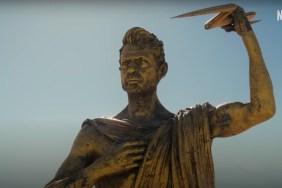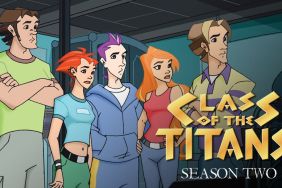Cast:
Sam Worthington as Perseus
Liam Neeson as Zeus
Ralph Fiennes as Hades
Jason Flemyng as Calibos / Acrisius
Gemma Arterton as Io
Alexa Davalos as Andromeda
Tine Stapelfeldt as Danae
Mads Mikkelsen as Draco
Luke Evans as Apollo
Izabella Miko as Athena
Liam Cunningham as Solon
Hans Matheson as Ixas
Ashraf Barhom as Ozal
Mouloud Achour as Kucuk
Ian Whyte as Sheikh Sulieman
Natalia Vodianova as Medusa
Nicholas Hoult as Eusebios
Vincent Regan as Kepheus
Polly Walker as Cassiopeia
Katherine Loeppky as Aged Cassiopeia
Luke Treadaway as Prokopion
Pete Postlethwaite as Spyros
Elizabeth McGovern as Marmara
Sinead Michael as Tekla
Ross Mullan as Pemphredo
Robin Berry as Enyo
Graham Hughes as Deino
Martin McCann as Phaedrus
Rory McCann as Belo
Kaya Scodelario as Peshet
Alexander Siddig as Hermes
Tamer Hassan as Ares
Danny Huston as Poseidon
William Houston as Ammon
Jamie Sives as Captain
Nina Young as Hera
Jane March as Hestia
Nathalie Cox as Artemis
Agyness Deyn as Aphrodite
Paul Kynman as Hephaestus
Charlotte Comer as Demeter
Directed by Louis Leterrier
Story:
Perseus (Sam Worthington) was raised by a fishermans family unaware that he actually was the bastard son of the God Zeus (Liam Neeson), but when Zeus nemesis, the God of the Underworld Hades (Ralph Fiennes) kills Perseus adopted family, he swears vengeance on the God and leads a quest of warriors to face Hades minions in order to save the city of Argos from the Kraken, which the Gods have promised to unleash if they dont sacrifice the beautiful princess Andromeda (Alexa Davalos).
Analysis:
The 1981 Greek mythology epic came out at the perfect time so that the products of the drug-induced free love of the ’60s were at the perfect age where they could appreciate the cheesiness of having an Oscar-winning actor proclaim lines like “Release the Kraken!” There isn’t as much cheese in Louis Leterrier’s remake, but it hasn’t completely lost the charm of the original even if it tries harder to be taken seriously and mostly works in that regard.
Wisely, they’ve created a far richer story to begin with, particularly in the reason for Perseus to go on such a dangerous quest, rather than just trying to save Princess Andromeda, and it’s a great set-up for a story told during a time when humans are starting to lose their faith in the Gods.
It takes a while before Sam Worthington finds his footing as Perseus, because there’s some horrendous overacting during the film’s first act, but where things really take off is when he’s joined by a band of merry (and not so merry) warriors with Liam Cunningham and a pair of hunting brothers providing enough levity to keep things light once the journey begins. Gemma Arterton is fantastic as the enigmatic Io, an immortal sent to protect and advise Perseus, and though her best moments are scattered throughout, the two of them clearly have strong chemistry. Mads Mikkelsen is equally enjoyable as Draco, the leader of the Argos army, and he really delivers in the action scenes.
Unlike the original, we’re not bouncing back and forth between earth and Mt. Olympus, which means the grandstanding of the Gods is mostly at the beginning and end. Either way, you can do far worse for Zeus and Hades than Liam Neeson and Ralph Fiennes, two fine actors who make more out of the roles than Laurence Olivier did in his day. Fiennes is quite ferocious as Hades, making a couple spectacular FX-driven entrances that would make his Voldermort alter-ego jealous. Otherwise, its a fairly large ensemble of characters, many of whom appear in flashbacks or in the background as the other Gods.
With a title like “Clash of the Titans,” everything has to have an epic scale and that’s certainly the case with the fantastic settings used to establish this world from Argos to Mt. Olympus and the real-world locations where the band of warriors end up really enhances the experience.
Undoubtedly, the creatures need not only live up to Ray Harryhausen’s earlier work in the original movie but also to the CG breakthroughs in the 28 years hence, and this is where Leterrier’s team really delivers with creatures that have real weight and substance. The Scorpioks aren’t just giant CGI scorpions, instead maintaining the look and feel of some of the wildest ’50s movie monsters. Similarly, the Medusa is done in a believable way by combining a live actor with serpentine tail and “head snakes” but just imperfect enough to remind us of the original. Having real actors portraying creatures like Jason Flemyng as Calibos makes a huge difference in allowing their interaction with humans to be believable, his two sword battles with Perseus really working well. Even small details like the way Pegasus gallops off rocky mountains in flight adds to the way Leterrier realizes how characterization is just as important to the creatures as to humans. Calibos, the Medusa and the Kraken all have their origins explained, which wasn’t the case in the original movie, and at times, all of that exposition does slow the first half of the movie down. Fortunately, there’s enough action later on to make up for it.
Some of those action scenes might be edited a bit too quickly to follow at times, but it’s all well-choreographed. The warriors’ encounter with the Medusa more than lives up to the original, leading to an even more satisfying pay-off when the Kraken is unleashed. This isn’t a cheesy Claymation monster either, but one of the largest, fiercest creatures we’ve seen on screen since Peter Jackson’s “King Kong,” essentially what anyone can hope for in what becomes a giant monster movie. (Whoever directs the proposed “Godzilla” remake would be wise to use “Clash’s” CG team.)
There’s already been a lot of chatter about Warner Bros.’ decision to convert the movie into 3D after the fact, and besides the general annoyance by those who realize it’s little more than a money grab, the 3D doesn’t necessarily look bad or distracting, just that it’s so minimal it almost feels unnecessary. It’s hard not to fixate on the fact there isn’t that much of a difference whether you’re wearing the glasses or not, but at least they don’t go overboard with it, which has often been the case. In fact, it’s a shame they didn’t make more of an effort to release the movie in IMAX, which would have made a much bigger difference in one’s theatrical enjoyment of the scope Leterrier and his team were going for and achieved.
The Bottom Line:
Regardless of that, you still end up with a thoroughly entertaining and fun adventure that delivers exactly what is expected from a movie called “Clash of the Titans,” nothing more or less, and certainly a movie that true fans of Greek mythology will appreciate. What Leterrier has done with the source material is even more impressive when you realize the movie only began filming a year ago, an achievement that would normally be unheard of considering the movie’s dependence on CG to work as well as it does.










